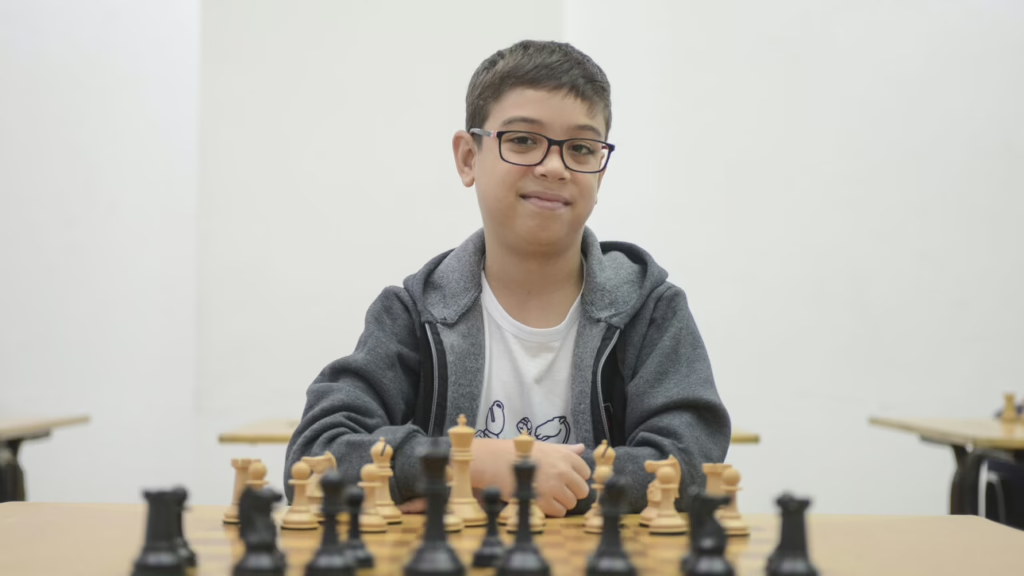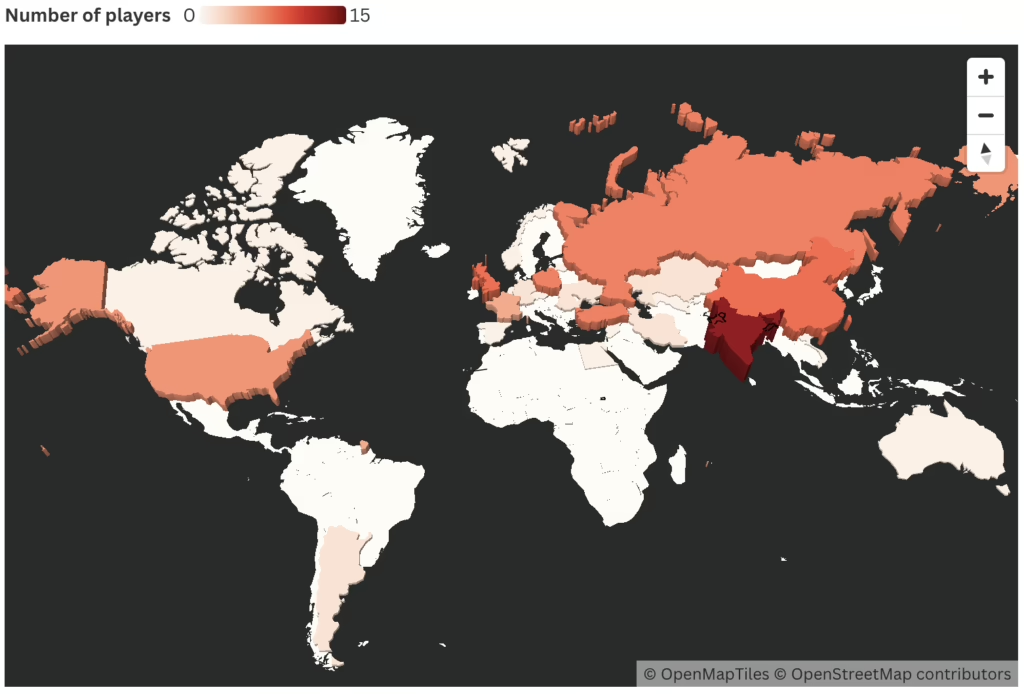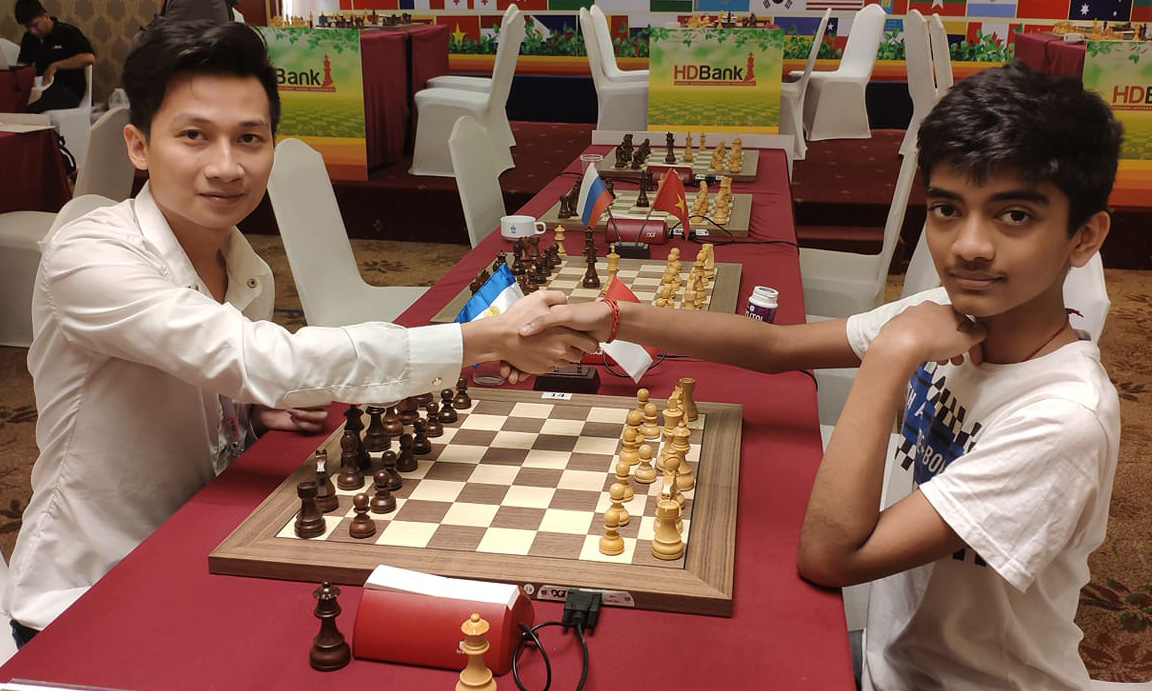Who are the brightest chess prodigies to watch in 2025? I’ve compiled a ranking of 45 young talents, from Faustino Oro to Yagiz Kaan Erdogmus, based on their age, Elo rating, and recent performances.
Preface
I chose to focus on the top 5 players by Elo from each birthyear category (2007 to 2015) based on their FIDE Elo ratings as of December 2024. This decision is practical because the article’s goal is to identify the Top 10 Chess Prodigies to Watch in 2025. If a player isn’t among the top 5 in their birth year, their chances of making the Top 10 are quite slim. By narrowing the pool to 45 players, the analysis remains focused while still providing a broad perspective across age groups.
For this index, I excluded players born in 2016 or later because, as of December 2024, their Elo ratings are all below 2000. Including them wouldn’t be meaningful for a list focused on identifying the Top 10 Prodigies to Watch in 2025.
Similarly, I didn’t include players born in 2006, but for a completely different reason: Gukesh Dommaraju. You might have heard of him, as he just became the 18th Classical World Chess Champion, dethroning Ding Liren a few weeks before. At this point, calling Gukesh a “prodigy” feels like calling a grandmaster “pretty decent at chess.” Let’s just say the 2006-born category is dominated by someone who no longer needs an introduction. Besides, these players would turn 19 in 2025, which no longer is considered a young player by some.
Additionally, the Rating Performance (RP) used in the index was calculated by myself based on players’ tournament performances from January 2024 to December 2024. There are various ways to calculate RP, but I followed the FIDE method, the same approach FIDE uses to evaluate performances when awarding IM and GM norms. This ensures consistency and reliability in evaluating players’ strength over the past year.
That said, this approach does have limitations. Chess rankings can fluctuate significantly, and some talented players might currently be outside the top 5 of their age group due to a rough patch in form or limited tournament activity. Similarly, while Elo and RP provide valuable insights, they don’t fully capture the nuanced progression of young talents, such as those who may have surged late in the year.
As a result, while the 45 players featured in this index represent a strong group of contenders, they might not encompass every rising star in the chess world. However, the methodology ensures that the Top 10 prodigies identified in this article are evaluated thoroughly and fairly, reflecting the most promising players to watch for in 2025. It’s a balancing act, and while no ranking can capture everything, I hope this effort highlights the brightest talents shaping the future of chess.
Top 10 Chess Prodigies by Overall Index

Faustino Oro
1. Faustino Oro (Score: 100)
The Argentine prodigy Faustino Oro, dubbed the “Messi of chess,” leads our list with a perfect score of 100. Born in 2013, Oro has smashed records left and right, including becoming the youngest player to reach 2300 Elo and later earning the International Master title at just 10 years, 8 months, and 16 days—a feat that broke Abhimanyu Mishra’s previous record.
What truly sets Oro apart is his versatility: not only does he excel in classical chess, but he also made headlines in May 2024 by defeating none other than Magnus Carlsen in a Bullet Brawl tournament. At 11 years old, his rating performance in the last 12 months was 2409, only trailing by Yagiz Kaan Erdogmus in the U13 category. It’s no wonder fans compare him to Messi.
You can read more about Faustino Oro and his move from Argentina to Spain, by click here.
2. Yagiz Kaan Erdogmus (Score: 99)
If Oro is Messi, Yagiz Kaan Erdogmus could be the “Cristiano Ronaldo of Chess”, and he was born 2 years before the Argentinian too. This Turkish prodigy, born in 2011, is currently the youngest grandmaster in the world and the youngest player in history to reach a staggering 2600 FIDE rating at just 13 years and 4 months.
While narrowly missing the top spot in our index, Erdogmus has a resume that screams future world champion. In Feb 2024, he won the 1st Jeddah International Chess Festival, ahead of many other prodigies like Raunak Sadhwani, Volodar Murzin or Pranav V. At 13 years old, his rating performance in the last 12 months was 2615, the second highest number of all the U18 players. People could easily argue that Erdogmus gotta be the first player in this list.
We already wrote an article about Yagiz Kaan Erdogmus.
3. Ethan Pang (Score: 94)
At just 9 years old, British prodigy Ethan Pang is the youngest player on this list—and perhaps the most exciting. Born in 2015, he recently shattered Faustino Oro’s record to become the youngest player to achieve a 2300 FIDE rating, cementing his status as a rising star.
Despite his age, Pang’s confidence and maturity at the board are remarkable. He’s already outplaying experienced opponents in international tournaments, as evidenced by his victory at the Vezerkepzo IM Tournament in Budapest. Being born in 2015 and already ranking this high is a testament to his potential. Pang might still be a kid, but his chess speaks for itself.
4. Ediz Gurel (Score: 91)
Ediz Gurel, born in 2008, is another Turkish prodigy making waves in the chess world. Gurel earned his grandmaster title in 2024 and has since established himself as the Turkiye’s leading chess player. His performance at the 45th Chess Olympiad, where he won an individual bronze medal with a stellar score of 9/11 on board two, highlights his ability to deliver on the big stage. He has the best Elo and RP in this list and perhaps deserves to have a higher score.
5. Abhimanyu Mishra (Score: 86)
Though slightly lower on the list, Abhimanyu Mishra is a name that is well known globally. Born in 2009, Mishra holds the record for being the youngest grandmaster in history, earning the title at just 12 years, 4 months, and 25 days. His record-setting feats started even earlier, becoming the youngest-ever player to achieve a USCF rating of 2000 at just 7 years old.
While Faustino Oro recently broke Mishra’s youngest IM record, Mishra’s legacy is already etched into chess history. At 15, he’s now transitioning into the higher echelons of chess, and his balanced approach ensures he’s still very much a prodigy to watch in 2025.
6. Roman Shogdzhiev (84)
At just 8 years old, Roman Shogdzhiev is already an international force to be reckoned with. The Moscow-born prodigy became a household name in 2023 when he swept the U8 World Youth Chess Championship, winning all 11 games—talk about dominance. His rapid development continued at the 2023 World Rapid and Blitz Chess Championships, where he shocked the chess world by defeating five grandmasters across the two formats.
7. Marc Llari (82)
France’s Marc Llari has a knack for winning—or nearly winning—everything he touches. In 2022, he clinched the U8 World Chess Championship, while also taking home silver medals in the European U8 Championship and the World U8 Chess Solving Championship. Marc’s balanced style and sharp problem-solving (also called as chess puzzles) abilities are impressive at such a young age. His score of 82 may place him just behind Shogdzhiev, but the rivalry between these two continues to push them both to new heights.
8. Ivan Zemlyanskii (77)
Ivan Zemlyanskii is the newest star on Russia’s chess scene, earning his Grandmaster title in August 2024 at the age of 13. Known for his gritty tournament performances, Ivan scored his final GM norm at the Sharjah Masters and followed it up with a solid showing at the ChessKid Youth Championship. His score of 77 may suggest he’s slightly behind others on this list, but don’t be fooled—his potential is enormous as he just showed in the 2024 Qatar Masters this December.
9. Sergey Sklokin (75)
Sergey Sklokin is nothing short of a phenomenon. Born in June 2013, he became a triple world champion in 2023, sweeping the U10 categories in Rapid, Blitz, and Solving at the World Chess Championships held in Georgia. This rare feat highlights his versatility and mastery across different formats of the game. Sergey’s score of 75 might place him near the bottom of the Top 10, but his achievements speak volumes about his talent. If he continues this trajectory, Sergey has the potential to become one of the most well-rounded players of his generation.
10. Andy Woodward (75)
Hailing from Frisco, Texas, Andy Woodward is already a name to watch. In September 2023, he made headlines by defeating Hans Niemann at the World Junior Chess Championship. Just a few months later, he reached the finals of the Puzzle World Championship, narrowly losing to defending champion Ray Robson. Andy’s crowning achievement came in January 2024, when he earned his final GM norm at the Jeddah International Chess Festival at the age of 13 years, 8 months, and 28 days. This made him the second youngest grandmaster in U.S. history, behind only Abhimanyu Mishra.
Read More: Lu Miaoyi: A Young Chess Prodigy Lighting Up the Board in 2025

Here’s a comprehensive explanation of the Overall Index for ranking the Top 10 Chess Prodigies to Watch in 2025.
What Is the Overall Index?
The Overall Index is a composite score designed to rank chess prodigies objectively across multiple performance metrics. It accounts for both absolute strength and relative dominance over peers, ensuring fairness across age groups. By combining four weighted variables, the index highlights players who excel not just in raw Elo but also in their recent performances and dominance compared to slightly older cohorts.
The index is normalized to a range of 50 to 100, making it intuitive for readers to understand rankings, with 100 representing the top player.
The Four Metrics
The Overall Index is based on four core metrics, each reflecting a unique aspect of chess strength and promise:
1. Relative Elo Advantage (Weight: 35%)
- Definition: This measures how much a player’s Elo rating exceeds the average Elo of players born in the same year.
- Purpose: It identifies players who are outperforming their direct peers in Elo.
- Formula:

- Interpretation: A higher value means the player significantly outshines their birth year cohort in Elo, a fundamental chess strength measure.
2. Relative Rating Performance Advantage (Weight: 25%)
- Definition: Similar to Elo, this measures how a player’s performance rating (calculated from tournaments over the last 12 months) compares to the average performance rating of their birth year.
- Purpose: It reflects recent form and consistency in tournaments, rewarding players with strong performances over the past year.
- Formula:

- Interpretation: A higher score indicates that a player is performing significantly better than others in their age group in recent competitions.
3. FIDE Elo Domination Score (Weight: 25%)
- Definition: This measures how a player’s Elo compares to the average Elo of players born one year earlier.
- Purpose: It rewards players who dominate not just their peers but also slightly older players, reflecting exceptional talent and accelerated growth.
- Formula:

- Interpretation: A higher score indicates that the player can compete with, or even outperform, slightly older peers, a hallmark of prodigious talent.
4. Performance Rating Domination Score (Weight: 15%)
- Definition: Like the Elo Domination Score, this measures how a player’s tournament performance compares to players born one year earlier.
- Purpose: It adds a dynamic element to the index, focusing on how recent tournament results stack up against older players.
- Formula:

- Interpretation: A higher score signifies the ability to achieve exceptional tournament results compared to slightly older competitors.
Calculating the Overall Index
To combine these four metrics, you weight each according to its significance:
- Relative Elo Advantage (35%): This highlights how much a player stands out within their birth year cohort, emphasizing peer dominance.
- Relative Rating Performance Advantage (25%): Focuses on recent tournament performances, rewarding players who perform better than others in their age group.
- FIDE Elo Domination Score (25%): The difference between a player’s Elo and the average Elo of players born one year earlier.
- Performance Rating Domination Score (15%): The difference between a player’s Rating Performance and the average RP of players born one year earlier.
Overall Index= 0.35×Relative Elo Advantage+0.25×Relative Rating Performance Advantage+0.25×FIDE Elo Domination Score+0.15×Performance Rating Domination Score
Normalization for Final Ranking
The Overall Index is normalized to a range of 50 to 100 to provide an intuitive and reader-friendly score:
Shifted Overall Index
First, shift all scores to ensure no negative values:

Here, the absolute value of Min Overall Index ensures the lowest index becomes zero.
Normalized Index (Range: 50 to 100)
Next, scale and floor the scores

- The top player gets a score of 100.
- The lowest score is 50, providing a fair baseline for all players, because the lowest player in this list can’t be rated with 0 score.
How the Index Works
- Emphasizes Talent Over Age: By using Relative Advantages and Domination Scores, the index accounts for differences in age and raw metrics, ensuring younger players with exceptional relative performances aren’t overlooked.
- Balances Past and Present: Elo rewards long-term consistency, while performance ratings highlight recent success.
- Fair Normalization (I think): Scores are rescaled to a clear 50–100 range, making it accessible for readers while preserving proportional differences.
The Full List of 45 Chess Prodigies
| Rank | Player Name | Birth Year | Federation | Score | Elo | PR |
|---|---|---|---|---|---|---|
| 1 | Faustino Oro | 2013 | ARG | 100 | 2433 | 2409 |
| 2 | Yagiz Kaan Erdogmus | 2011 | TUR | 99 | 2599 | 2615 |
| 3 | Ethan Pang | 2015 | ENG | 94 | 2300 | 2160 |
| 4 | Ediz Gurel | 2008 | TUR | 91 | 2624 | 2649 |
| 5 | Abhimanyu Mishra | 2009 | USA | 86 | 2616 | 2605 |
| 6 | Roman Shogdzhiev | 2015 | FID | 84 | 2260 | 2081 |
| 7 | Marc Llari | 2014 | FRA | 82 | 2268 | 2207 |
| 8 | Ivan Zemlyanskii | 2010 | RUS | 77 | 2543 | 2552 |
| 9 | Sergey Sklokin | 2013 | FID | 75 | 2329 | 2230 |
| 10 | Andy Woodward | 2010 | USA | 75 | 2530 | 2545 |
| 11 | Sina Movahed | 2010 | IRI | 73 | 2518 | 2544 |
| 12 | Ihor Samunenkov | 2009 | UKR | 73 | 2543 | 2538 |
| 13 | Marc`Andria Maurizzi | 2007 | FRA | 72 | 2576 | 2596 |
| 14 | Aaron Reeve Mendes | 2012 | CAN | 70 | 2359 | 2305 |
| 15 | Dimitar Mardov | 2008 | USA | 69 | 2504 | 2551 |
| 16 | Xue Haowen | 2008 | CHN | 69 | 2502 | 2544 |
| 17 | Shreyas Royal | 2009 | ENG | 69 | 2522 | 2513 |
| 18 | Bharath Subramaniyam H | 2007 | IND | 68 | 2561 | 2567 |
| 19 | Savva Vetokhin | 2009 | FID | 66 | 2502 | 2517 |
| 20 | Tong (QD) Xiao | 2008 | CHN | 66 | 2502 | 2502 |
| 21 | Marius Deuer | 2008 | GER | 65 | 2507 | 2484 |
| 22 | Brewington Hardaway | 2009 | USA | 65 | 2499 | 2499 |
| 23 | Vaclav Finek | 2010 | CZE | 64 | 2477 | 2478 |
| 24 | David Lacan Rus | 2012 | FRA | 63 | 2344 | 2224 |
| 25 | Mark Smirnov | 2012 | KAZ | 61 | 2336 | 2220 |
| 26 | Reyaansh Chakrabarty | 2014 | AUS | 61 | 2182 | 2058 |
| 27 | Mohammad Mehdi Abbasi Abeluie | 2013 | IRI | 61 | 2259 | 2152 |
| 28 | Mazen Fandi | 2013 | SYR | 61 | 2278 | 2116 |
| 29 | Bodhana Sivanandan | 2015 | ENG | 60 | 2074 | 2079 |
| 30 | Duy Khuong Dau | 2011 | VIE | 60 | 2412 | 2379 |
| 31 | Wiktor Golis | 2012 | POL | 59 | 2313 | 2224 |
| 32 | Ashwath Kaushik | 2015 | SGP | 59 | 2081 | 2041 |
| 33 | Atilla Kuru | 2011 | TUR | 58 | 2418 | 2349 |
| 34 | Khagan Ahmad | 2011 | AZE | 58 | 2403 | 2376 |
| 35 | Goutham Krishna H | 2010 | IND | 58 | 2466 | 2415 |
| 36 | Jagadeesh Siddharth | 2007 | SGP | 58 | 2510 | 2506 |
| 37 | Abdalrahman Sameh Mohamed | 2014 | EGY | 58 | 2158 | 2049 |
| 38 | Ilan Schnaider | 2011 | ARG | 56 | 2392 | 2361 |
| 39 | Ivan Kukushkin | 2014 | LAT | 56 | 2165 | 2005 |
| 40 | Jan Klimkowski | 2007 | POL | 56 | 2504 | 2471 |
| 41 | Read Samadov | 2007 | AZE | 55 | 2501 | 2477 |
| 42 | Louis Cheng | 2015 | SCO | 55 | 2087 | 1977 |
| 43 | Boris Kolodziejczyk | 2014 | FRA | 54 | 2133 | 2035 |
| 44 | ZiLong Yang | 2012 | CHN | 50 | 2314 | 2094 |
| 45 | George Zhao | 2013 | ENG | 50 | 2220 | 205 |
If you enjoy this post and want to dive deeper into chess, sign up for our newsletter! Stay updated with the latest news summarized, tips, and articles delivered straight to your inbox every week or month. You can unsubscribe any time.

I’m Xuan Binh, the founder of Attacking Chess, and the Deputy Head of Communications at the Vietnam Chess Federation (VCF). My chess.com and lichess rating is above 2300, in both blitz and bullet.


4 thoughts on “Top 10 Chess Prodigies to Watch in 2025”
Comments are closed.